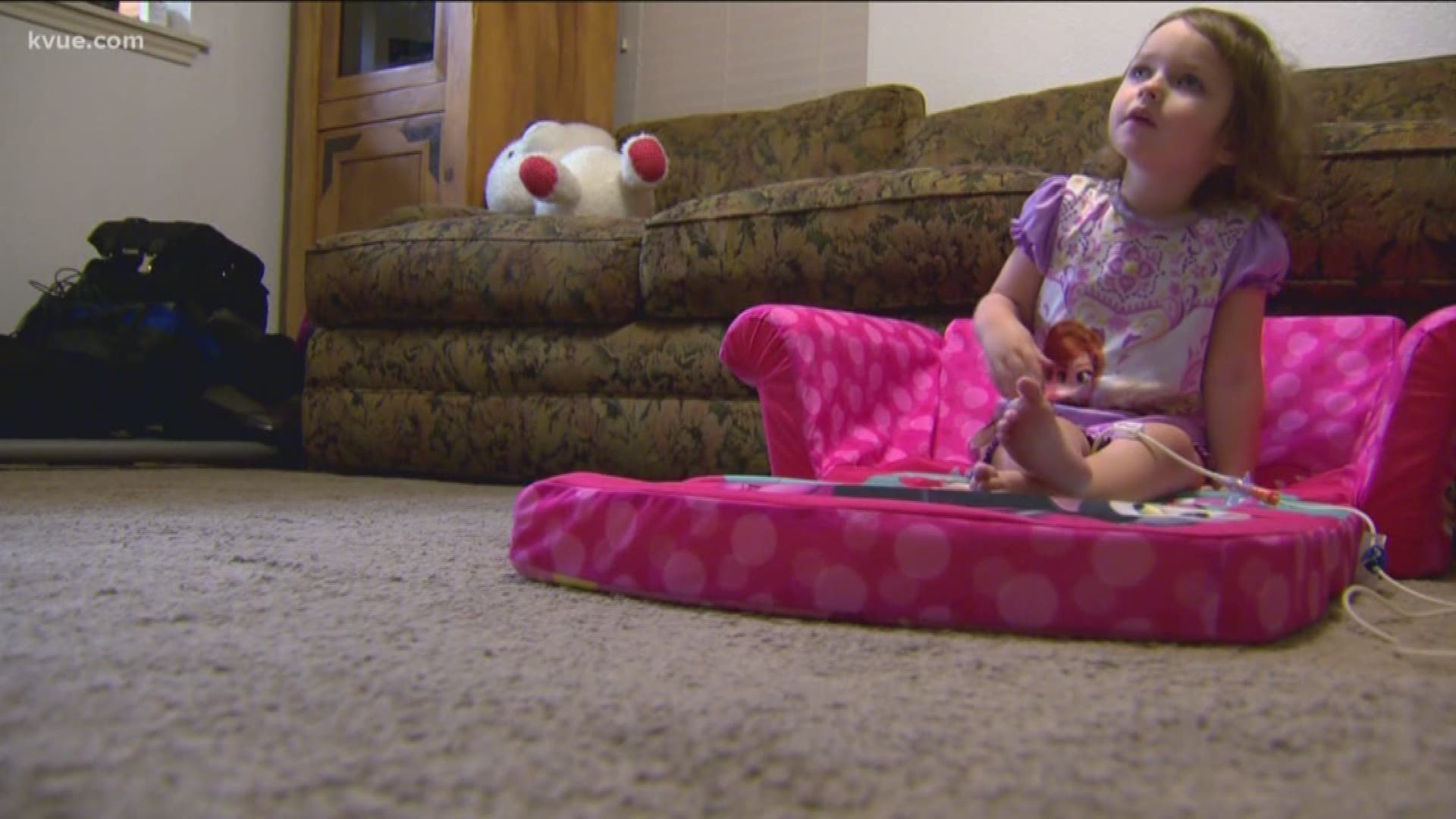CEDAR PARK, Texas — Every morning is a hectic morning for the Cline family.
They have to make sure their oldest daughter, Bella, has breakfast and is ready for her day.
But they also have to keep a close eye on their younger daughter, three-year-old Sophia, to make sure she’s getting everything she needs.
RELATED: Central Texas family told divorce would be one of their only options for Social Security Assistance
Sophia suffers from Rett Syndrome. It’s a rare genetic disorder that happens at conception and causes debilitating symptoms. According to Sophia’s mom, Jacque, those include a mixture of the symptoms from ALS, epilepsy, muscular dystrophy, Parkinson’s disease and more.
Sophia has always had Rett’s, but for the first year or so of her life, she had no symptoms. She could walk and eat normally.
Now, things are different.
“Before she went through her regression, she would eat anything,” Jacque said. “You put it in front of her, she would down it. She hit her regression, went through her regression, and she wouldn’t even make a sucking motion with her mouth.”
Since her regression, Sophia requires almost constant care.
While father Cody is at work and Bella is at school, that responsibility is on Jacque.
She gets Sophia started on her therapies each morning.
They work on leg strength. Before her regression, Sophia was able to walk. Now every step is a chore.
Trying to walk also causes Sophia some pain – which can be hard for her parents to see.
“As a parent, you instantly feel like you’ve failed. Like you did this to her. Whenever in reality, I know that there’s absolutely no way we gave her this,” Jacque said. “I would give anything if I could just take her place. I would happily not walk, not eat, not move if it gave her the option to do it.”
And leg strength isn’t the only thing Sophia has to work on. She’s currently in occupational therapy, physical therapy, eye-patch therapy, speech therapy and doing chiropractic work.
She is doing something every day to continue to grow skills and keep the skills she has regained since her regression.
Because with Rett’s, if you don’t constantly use your skills, it can be easy to lose them.
“It gets to be very stressful for us because we know she’s in pain, we know that something’s going on, but we don’t know where it is. We don’t know what type of pain it is,” Jacque said.
Jacque said speech therapy is one of Sophia’s favorites. It’s a chance for everyone to see her personality, to see what she’s like.
“You know, even though she’s in the room and she can’t communicate verbally…Cognitively, she’s 100 percent there. And she’s 100 percent diva three-year-old,” Jacque said.
“She fights every day to be normal,” Cody said.
While Jacque is with Sophia in the mornings, Cody is at work at his office until noon. After that, he heads back home to continue working where he can also keep an eye on Sophia – splitting his focus between work and caring for her.
“It’s a constant cycle of ‘I’m working, now I’m at home, now I’m doing something for Sophie, now I’m working from home,’” Cody said. “Everything has to be coordinated. Everything has to be scheduled.”
At around 2 p.m., Jacque heads to her job at a call center.
Because the Cline family does not qualify for Social Security assistance, this is how they’ve been able to afford what they can now.
They also rely on family support and use bi-annual garage sales to raise money.
And because the Clines don’t qualify for Social Security assistance, they can’t afford other therapies for Sophia that they wish she could be enrolled in – like music therapy, aqua therapy and hippotherapy. All of those options would be covered by a compassionate care allowance from the Social Security Administration. Their private insurance doesn’t cover them. Until last year, it didn’t even cover Sophia’s nutrition.
But Jacque said there’s no question why they go through all this trouble.
“The ‘why’ is always the hardest thing because, unless you’re a parent, you don’t get the ‘why.’ But once you become a parent, the why’s not even a question,” she said. “Because it’s just automatic. It’s instant. You do what you have to do to make sure your children have what they need.”
For more information on Sophia, you can click here.

